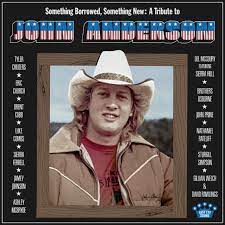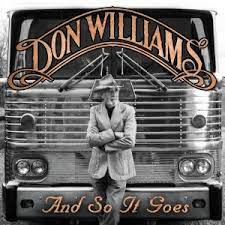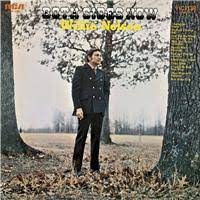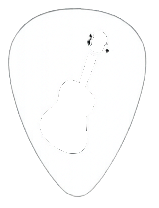Best Marty Robbins Songs to Learn on Guitar
Marty Robbins wasn't just a country music icon — he was a musical
storyteller whose voice defined an era. If you’re a fan of western
ballads, rich vocals, and timeless guitar-driven melodies, you’ll love
this collection of 10 Marty Robbins songs you can learn on acoustic
guitar.
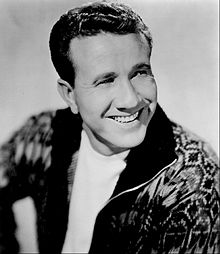
Whether you're drawn to dramatic tales like “El Paso” or smooth hits like “Devil Woman,” this page offers rhythm tips, chords, and step-by-step video support to help you bring these legendary tracks to life.
🎸 Overview Video - “Watch This Preview of My Marty Robbins Guitar Songs”
Marty Robbins Guitar Lesson Titles
20th Century DrifterBig Iron
Devil Woman
Don't Worry
El Paso
El Paso City
Love Me
Singing The Blues
Streets Of Laredo
You Gave Me A Mountain
1. 20th Century Drifter
- Learn To Play On Guitar
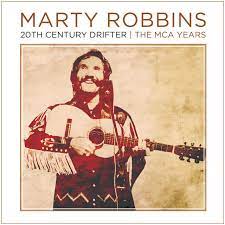
20th Century Drifter was a top 10 hit for Marty Robbins in 1974 on the Billboard country singles chart.. It was written by Larry Gatlin and was a top 10 hit
The song is a tribute to Robbins himself, who was known as a "twentieth-century drifter" due to his restless spirit and constant touring. The lyrics describe the life of a traveling musician, always on the road and never staying in one place for too long.
The song's upbeat melody and catchy chorus make it a memorable tribute to Robbins' legacy as a country music legend
Chords And Strumming
I play this song in standard tuning and a capo 2nd fret is the original key. For rhythm play a root down up down up down up root down up down up down up and repeat. Some lead required with the chords D, Bm, Em, A7, E7, Gb and a G.
Guitar Lesson Details - (chords & lyrics sheet incl with lesson)
Back To Song List
2. Big Iron
- Learn To Play On Guitar
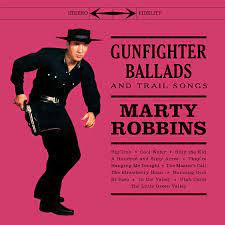
Big Iron is a classic Western ballad written and recorded by American singer-songwriter Marty Robbins. It was released in 1959 as a single and later included on his album "Gunfighter Ballads and Trail Songs." The song tells the story of a legendary Arizona Ranger who goes by the name of "Texas Red."
The song's narrative is told from the perspective of an unnamed narrator, who describes Texas Red as a feared outlaw who has committed numerous crimes. The Arizona Ranger sets out to capture him, and the two men engage in a gunfight in the town of Agua Fria, Arizona. The Ranger emerges victorious, and the townspeople praise him for his bravery.
Chords And Strumming
The chords in this number are Dbm, Ab7, E, A and an E6 in standard tuning. Some lead with a root down up down up down up and repeat rhythm pattern works here.
Guitar Lesson Details - (chords & lyrics sheet incl with lesson)
Back To Song List
3. Devil Woman
- Learn To Play On Guitar

Devil Woman was another great tune written and recorded by Marty Robbins. It was released as a single from his album "Devil Woman," which was released in 1962. ." The song tells the story of a man who becomes infatuated with a mysterious woman with a dark past.
The song's narrative is told from the perspective of the man, who warns others to stay away from the woman. He describes her as a "devil woman" who has a hold on him despite his better judgment. He knows that she is trouble, but he cannot resist her charms.
"Devil Woman" became one of Marty Robbins' biggest hits, reaching number one on the Billboard Hot Country Singles chart. Its memorable melody and haunting lyrics have made it a fan favorite, and it has been covered by many other artists over the years. The song's chorus, which repeats the phrase "Devil woman, let go of me," has become an iconic part of Robbins' legacy as a country music legend.
The song was also a top 5 in the UK and Australia.
Chords And Strumming
This one I play with a capo 2nd fret with drop D tuning and some lead required. Play a root down up root up down up and repeat rhythm pattern with the chords D, A7 and G.
Guitar Lesson Details - (chords & lyrics sheet incl with lesson)
Back To Song List
4. Don't Worry - Learn To Play On Guitar
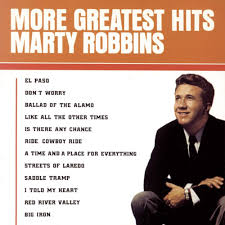
Don't Worry is a track from Marty's 1961 album "More Greatest Hits". This song peaked at #1 on the country charts and crossed over to the Hot 100 where it reached #3.
Session musician Grady Martin had some issues with distortion feeding into his track which if you listen to the track you'll here it. Grady Martin didn't like it but it was left in by the producer
That event resulted in the Maestro FZ-1 Fuzz-Tone, probably one of the first guitar distortion pedals that was made by Gibson as they had reverse engineered what happened to develop that new product.
Chords And Strumming
This one I play in drop D tuning with standard tuning. The rhythm here is a simple down up down up with walking bass and some lead. The chords you'll need are a D, G and an A.
Guitar Lesson Details - (chords & lyrics sheet incl with lesson)
Back To Song List
5. El Paso
- Learn To Play On Guitar
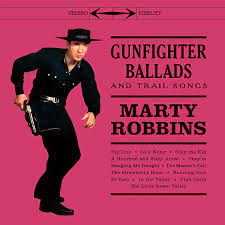
El Paso is a classic country and western song written and recorded by American singer-songwriter Marty Robbins. It was released in 1959 as a single and later included on his album "Gunfighter Ballads and Trail Songs." The song tells the story of a cowboy who falls in love with a Mexican dancer named Felina in the town of El Paso, Texas.
The song's narrative is told from the perspective of the cowboy, who describes his love for Felina and his actions to defend her honor after she is insulted by another man. The story takes a tragic turn when the cowboy kills the man in a fit of jealousy, and he becomes a fugitive from the law. The song ends with the cowboy returning to El Paso to be with Felina, where he is shot and killed by a posse.
"El Paso" became one of Marty Robbins' biggest hits and is considered a classic of the Western music genre. It won the Grammy Award for Best Country & Western Recording in 1961 and has been covered by numerous other artists over the years.
Chords And Strumming
The chords here are a D, Em, A7, G and a D7 played in standard tuning. You can play a bit of a shuffle strum here with a down down up down up and repeat. There is no lead in my version here, strictly rhythm.
Guitar Lesson Details - (chords & lyrics sheet incl with lesson)
Back To Song List
6. El Paso City - Learn To Play On Guitar
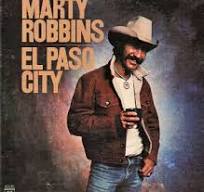
El Paso City was released as a single from the 1976 album of the same name was was a hit, reaching the top of the country charts.
It was his first hit after a 6 year dry spell and claimed he wrote the song in the amount of time it takes to sing it, which is under 5 min. He had the same experience with his 1959 song El Paso, which came to him very fast.
Chords And Strumming
This one I play in standard tuning with the chords C, C7, F, G and a G7. No lead in here but the song has some riffs and background horns which can be blended into the rhythm. For rhythm you can play a root down up root down up down up.
Guitar Lesson Details - (chords & lyrics sheet incl with lesson)
Back To Song List
7. Love Me
- Learn To Play On Guitar
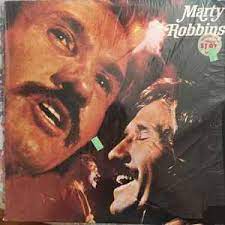
Love Me is a classic country and western song written by Jeanne Pruett and recorded by Marty Robbins in 1973. The song features Robbins' smooth vocals and a gentle melody that captures the song's tender lyrics about a man pleading for the love of a woman.
The song was one of four singles released from Marty Robbins' 1973 self-titled album.
The song reached No. 9 on the US Country charts and No. 3 on the Canadian charts, making it one of the most successful singles from the album.
Chords And Strumming
This one I play in standard tuning with a simple root down up root up down up rhythm pattern or you could use a root down up bass up down up pattern. The chords here are G, G7, C and a D. No lead in the original but I have a simple break here in my version.
Guitar Lesson Details - (chords & lyrics sheet incl with lesson)
Back To Song List
8. Singing The Blues
- Learn To Play On Guitar
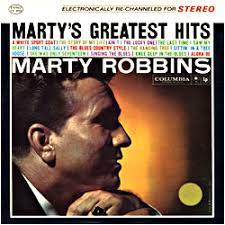
Singing The Blues was released by Marty Robbins in 1956 and was one of his earliest hits and helped to establish him as a major figure in the country and western music scene. The song was written by Melvin Endsley and had previously been recorded by other artists, but Robbins' version became the most popular.
Robbins' version of the song features a lively rockabilly rhythm and his signature smooth vocals, which give the song a unique and memorable sound. "Singing the Blues" topped the country charts and also became a hit on the pop charts, reaching No. 17.
The success of "Singing the Blues" helped to launch Marty Robbins' career and set the stage for a string of hit songs in the coming years. The song remains a beloved classic of the country and western genre and has been covered by many other artists over the years.
The track was released in 1956 from his Marty's Greatest Hits album.
Chords And Strumming
The chords in this one are an A7, D, G, Ab, A and a D7 and played with drop D tuning and a Capo 2nd fret. For rhythm play a root down up root up down up and some lead required.
Guitar Lesson Details - (chords & lyrics sheet incl with lesson)
Back To Song List
9. Streets Of Laredo
- Learn To Play On Guitar
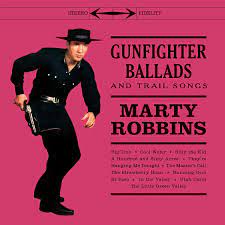
Streets of Laredo is one of his most iconic and enduring songs. The song is a traditional Western ballad that tells the story of a dying cowboy who reflects on his life and experiences.
Robbins' version of the song features his signature smooth vocals, accompanied by acoustic guitar and a gentle, melancholy melody. The song's haunting lyrics and evocative melody have made it a favorite of country and western fans for generations.
"Streets of Laredo" was released on Marty Robbins' 1965 album "More Gunfighter Ballads and Trail Songs." The album was a follow-up to Robbins' highly successful 1959 album "Gunfighter Ballads and Trail Songs," which also featured a number of classic Western ballads and helped to establish Robbins as a major force in the country and western music scene.
Over the years this number has been covered by many other artists and has become a staple of the country and western music canon. The song's enduring popularity is a testament to the timeless appeal of traditional Western ballads and to the unique talents of Marty Robbins as a singer and storyteller.
Chords And Strumming
I use a capo 3rd on this number with drop D tuning. For rhythm play a root down up down up and repeat. Some lead in the middle of the song in my version here.
Guitar Lesson Details - (chords & lyrics sheet incl with lesson)
Back To Song List
10. You Gave Me A Mountain
- Learn To Play On Guitar
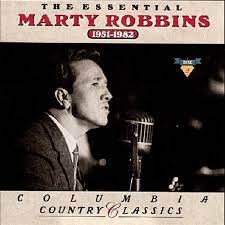
You Gave Me A Mountain is a powerful and emotional ballad that has become one of Marty Robbin's most beloved songs. The song was written by Marty in 1969 and it tells the story of a man who has faced many challenges in his life but finds strength and resilience through his faith and love.
Robbins' version of the song features his signature smooth vocals, backed by a simple yet effective arrangement that builds in intensity as the song progresses. The lyrics of the song are deeply personal and introspective, reflecting the struggles and triumphs of the human spirit.
"You Gave Me a Mountain" was released as a single in 1971 and became a hit on both the country and pop charts. The song has been covered by many other artists over the years, including Elvis Presley, who recorded a version of the song in 1973 that also became a hit.
Chords And Strumming
The chords here are C, Am, Dm, Gsus, G, F and an A+ and played in standard tuning. A bit of a lead break in here as you play a down up down up down and repeat so you have a continuous double down stroke pattern going on.
Guitar Lesson Details - (chords & lyrics sheet incl with lesson)
Back To Song List
Marty Robbins' songs continue to stand the test of time thanks to their lyrical richness and emotional depth — and learning them on guitar is a great way to appreciate his artistry on a deeper level. These lessons offer an immersive way to connect with country music history while building your rhythm and chord confidence.
If you enjoyed this page, be sure to explore similar artists like Johnny Cash, Merle Haggard, and Don Williams using the image links below.
If you liked this Marty Robbins guitar songs page, you might also like ... (click images)
Very Easy Country Guitar Songs
